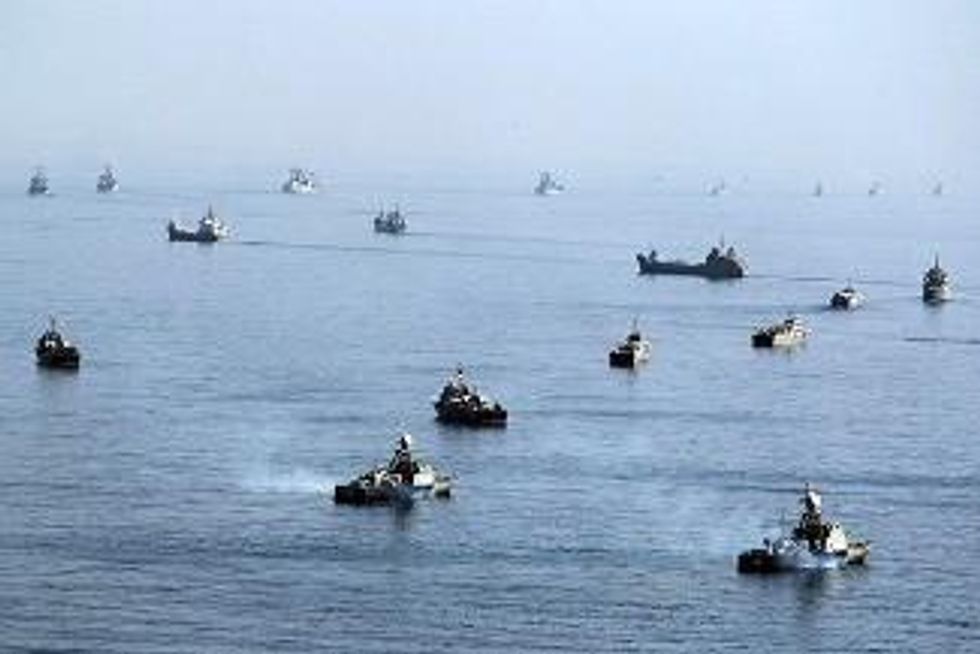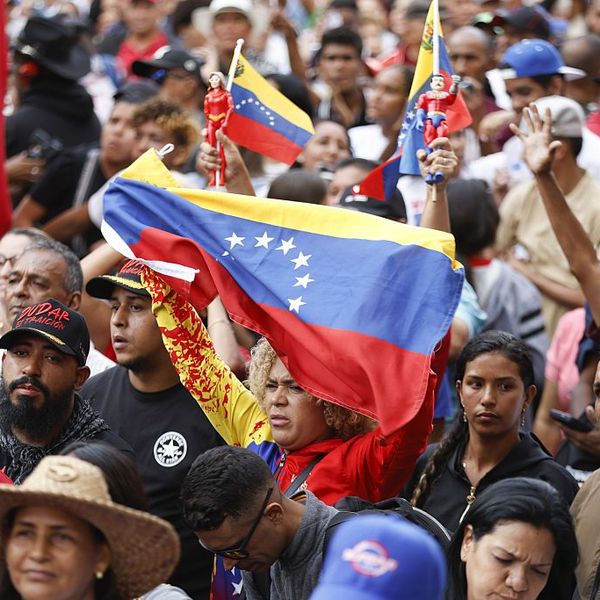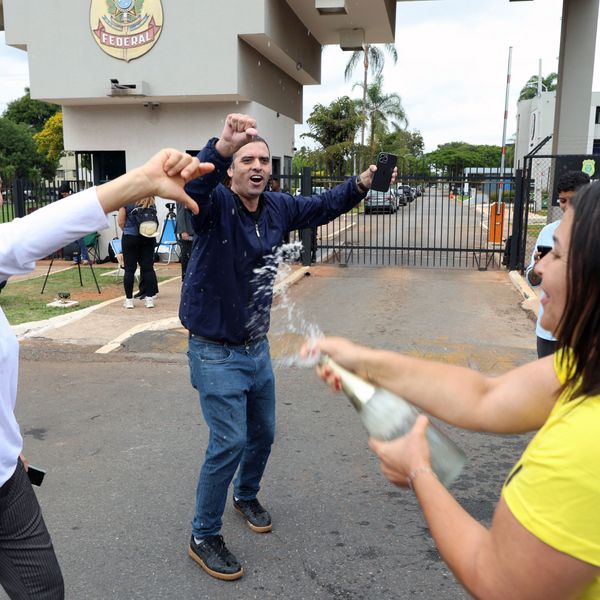Brazil Takes the Lead In Trying to Prevent Another Senseless War
Brazil's foreign minister, Antonio Patriota, made a courageous and very important statement last week about the rising threat of a military attack on Iran. He asked UN Secretary General Ban Ki-moon to weigh in on the legality of a threatened military strike against Iran.
Brazil's foreign minister, Antonio Patriota, made a courageous and very important statement last week about the rising threat of a military attack on Iran. He asked UN Secretary General Ban Ki-moon to weigh in on the legality of a threatened military strike against Iran.
"One sometimes hears the expression, 'all options are on the table.' But some actions are contrary to international law," said Patriota.

The people who keep saying "all options are on the table," with respect to Iran, include various U.S. and Israeli officials, and most importantly President Obama himself.
And everyone knows what they mean when they say "all options are on the table": they reserve the "right" to bomb Iran if they don't get what they want through non-military means, including economic sanctions.
But such an action would indeed be "contrary to law," as Patriota suggested. In fact, it is a very serious crime under international law, and a clear violation of the United Nations Charter (Article 2). Even threatening to use military force against another UN member state - which President Obama and the Israeli government have done-- is a violation of the UN Charter.
Here in the United States, the media - especially the biggest TV and radio media that have the largest audience - have been producing war propaganda about the "threat" from Iran, in a virtual replay of the run-up to the 2003 invasion of Iraq. The U.S. Congress, led by neoconservatives and the AIPAC (Israel) lobby, has been pushing to cut off diplomatic solutions. A resolution currently before the U.S. Senate would encourage military action against Iran for merely having the "capability" to produce a nuclear weapon - something that Brazil, Argentina, Japan, and other countries with peaceful nuclear energy programs already have.
And all this despite the fact that Iran is in compliance with the nuclear non-proliferation treaty, including the required inspections, and has shown no intention to violate the treaty. And the consensus view of America's sixteen intelligence agencies, the New York Times reported on Saturday, is that "there is no hard evidence that Iran has decided to build a nuclear bomb."
It is vitally important that nations who have an interest in maintaining the peace, and in a world more governed by international treaties and diplomacy - rather than by force - speak up, as Brazil has now done, before a war begins.
Patriota's statement is very important. There is much more that can be done. Brazil could work with the BRICS grouping (Brazil, Russia, India, China, South Africa) and UNASUR (the Union of South American Nations) to get further statements and commitments. These groups or their member countries could issue statements about how they would respond to a country that carries out an unprovoked military attack on Iran. For example, they could pledge to recall their ambassadors from that country; break diplomatic relations; or review their commercial relations, with a possibility of selective economic sanctions.
It's worth the effort, to prevent another unnecessary war and its inevitable atrocities.
An Urgent Message From Our Co-Founder
Dear Common Dreams reader, The U.S. is on a fast track to authoritarianism like nothing I've ever seen. Meanwhile, corporate news outlets are utterly capitulating to Trump, twisting their coverage to avoid drawing his ire while lining up to stuff cash in his pockets. That's why I believe that Common Dreams is doing the best and most consequential reporting that we've ever done. Our small but mighty team is a progressive reporting powerhouse, covering the news every day that the corporate media never will. Our mission has always been simple: To inform. To inspire. And to ignite change for the common good. Now here's the key piece that I want all our readers to understand: None of this would be possible without your financial support. That's not just some fundraising cliche. It's the absolute and literal truth. We don't accept corporate advertising and never will. We don't have a paywall because we don't think people should be blocked from critical news based on their ability to pay. Everything we do is funded by the donations of readers like you. Will you donate now to help power the nonprofit, independent reporting of Common Dreams? Thank you for being a vital member of our community. Together, we can keep independent journalism alive when it’s needed most. - Craig Brown, Co-founder |
Brazil's foreign minister, Antonio Patriota, made a courageous and very important statement last week about the rising threat of a military attack on Iran. He asked UN Secretary General Ban Ki-moon to weigh in on the legality of a threatened military strike against Iran.
"One sometimes hears the expression, 'all options are on the table.' But some actions are contrary to international law," said Patriota.

The people who keep saying "all options are on the table," with respect to Iran, include various U.S. and Israeli officials, and most importantly President Obama himself.
And everyone knows what they mean when they say "all options are on the table": they reserve the "right" to bomb Iran if they don't get what they want through non-military means, including economic sanctions.
But such an action would indeed be "contrary to law," as Patriota suggested. In fact, it is a very serious crime under international law, and a clear violation of the United Nations Charter (Article 2). Even threatening to use military force against another UN member state - which President Obama and the Israeli government have done-- is a violation of the UN Charter.
Here in the United States, the media - especially the biggest TV and radio media that have the largest audience - have been producing war propaganda about the "threat" from Iran, in a virtual replay of the run-up to the 2003 invasion of Iraq. The U.S. Congress, led by neoconservatives and the AIPAC (Israel) lobby, has been pushing to cut off diplomatic solutions. A resolution currently before the U.S. Senate would encourage military action against Iran for merely having the "capability" to produce a nuclear weapon - something that Brazil, Argentina, Japan, and other countries with peaceful nuclear energy programs already have.
And all this despite the fact that Iran is in compliance with the nuclear non-proliferation treaty, including the required inspections, and has shown no intention to violate the treaty. And the consensus view of America's sixteen intelligence agencies, the New York Times reported on Saturday, is that "there is no hard evidence that Iran has decided to build a nuclear bomb."
It is vitally important that nations who have an interest in maintaining the peace, and in a world more governed by international treaties and diplomacy - rather than by force - speak up, as Brazil has now done, before a war begins.
Patriota's statement is very important. There is much more that can be done. Brazil could work with the BRICS grouping (Brazil, Russia, India, China, South Africa) and UNASUR (the Union of South American Nations) to get further statements and commitments. These groups or their member countries could issue statements about how they would respond to a country that carries out an unprovoked military attack on Iran. For example, they could pledge to recall their ambassadors from that country; break diplomatic relations; or review their commercial relations, with a possibility of selective economic sanctions.
It's worth the effort, to prevent another unnecessary war and its inevitable atrocities.
Brazil's foreign minister, Antonio Patriota, made a courageous and very important statement last week about the rising threat of a military attack on Iran. He asked UN Secretary General Ban Ki-moon to weigh in on the legality of a threatened military strike against Iran.
"One sometimes hears the expression, 'all options are on the table.' But some actions are contrary to international law," said Patriota.

The people who keep saying "all options are on the table," with respect to Iran, include various U.S. and Israeli officials, and most importantly President Obama himself.
And everyone knows what they mean when they say "all options are on the table": they reserve the "right" to bomb Iran if they don't get what they want through non-military means, including economic sanctions.
But such an action would indeed be "contrary to law," as Patriota suggested. In fact, it is a very serious crime under international law, and a clear violation of the United Nations Charter (Article 2). Even threatening to use military force against another UN member state - which President Obama and the Israeli government have done-- is a violation of the UN Charter.
Here in the United States, the media - especially the biggest TV and radio media that have the largest audience - have been producing war propaganda about the "threat" from Iran, in a virtual replay of the run-up to the 2003 invasion of Iraq. The U.S. Congress, led by neoconservatives and the AIPAC (Israel) lobby, has been pushing to cut off diplomatic solutions. A resolution currently before the U.S. Senate would encourage military action against Iran for merely having the "capability" to produce a nuclear weapon - something that Brazil, Argentina, Japan, and other countries with peaceful nuclear energy programs already have.
And all this despite the fact that Iran is in compliance with the nuclear non-proliferation treaty, including the required inspections, and has shown no intention to violate the treaty. And the consensus view of America's sixteen intelligence agencies, the New York Times reported on Saturday, is that "there is no hard evidence that Iran has decided to build a nuclear bomb."
It is vitally important that nations who have an interest in maintaining the peace, and in a world more governed by international treaties and diplomacy - rather than by force - speak up, as Brazil has now done, before a war begins.
Patriota's statement is very important. There is much more that can be done. Brazil could work with the BRICS grouping (Brazil, Russia, India, China, South Africa) and UNASUR (the Union of South American Nations) to get further statements and commitments. These groups or their member countries could issue statements about how they would respond to a country that carries out an unprovoked military attack on Iran. For example, they could pledge to recall their ambassadors from that country; break diplomatic relations; or review their commercial relations, with a possibility of selective economic sanctions.
It's worth the effort, to prevent another unnecessary war and its inevitable atrocities.

